Apply now to join our next cohort of Community Science Fellows and Community Leads!
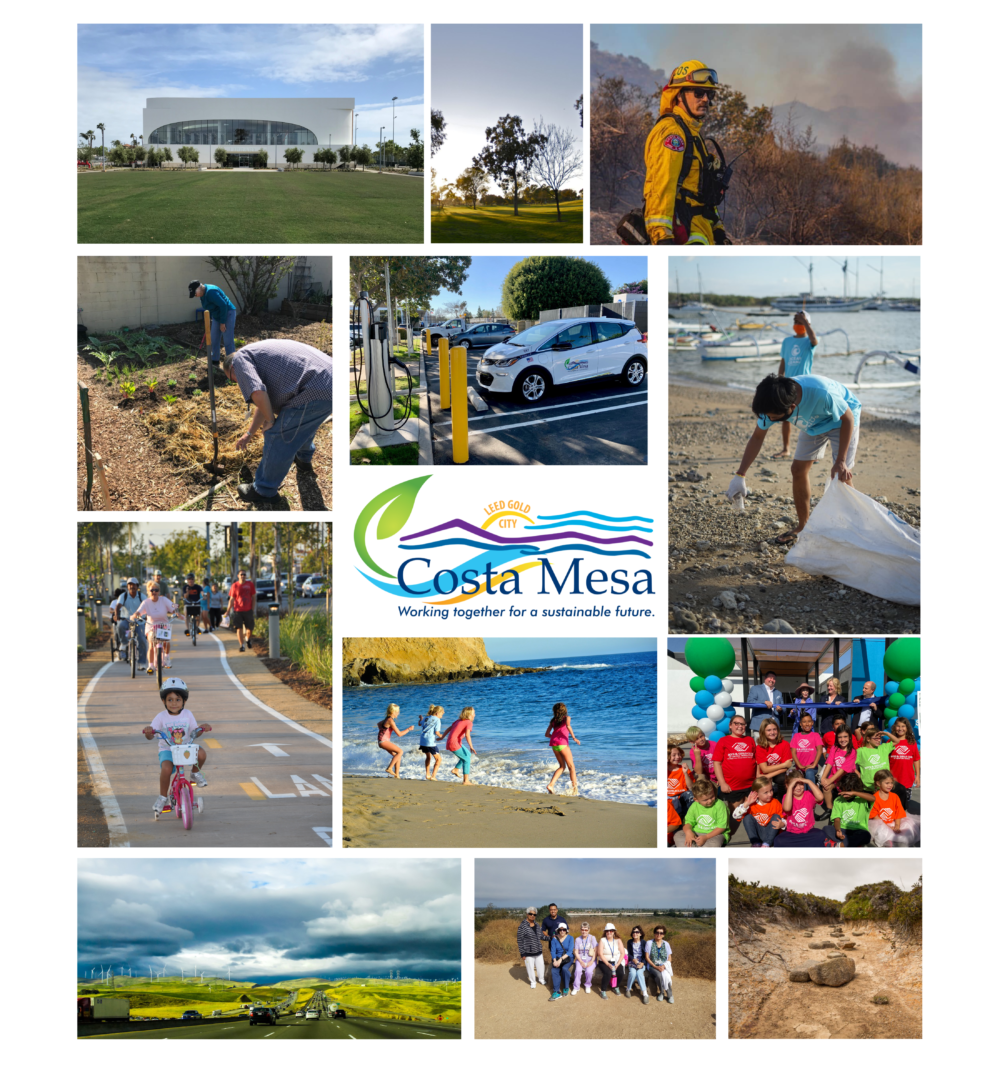
Collage courtesy of the City of Costa Mesa
The problem this project plans to address is to raise awareness by (1) educating Costa Mesa residents on how climate change affects their health and wellbeing, and (2) working together in a workshop setting to identify strategies and initiatives community members can take to enhance physical and mental health.
Climate change is affecting the social and environmental determinants of human health such as clean air, safe drinking water, sufficient food and secure shelter.
Extremes in weather conditions, increased pollution, environmental toxins, and changes in food security can all cause physical and mental health problems. The Center for Disease Control and Prevention (CDC) page on climate effects on health highlights the pressing need to prepare for potential health risks. In addition, the recent increases in the severity and frequency of wildfires and extreme heat waves in California has also made it critical for cities to take actions to address the negative impacts of climate change on community health and wellbeing – especially in vulnerable (e.g. seniors, children, pregnant women) and low-income communities.
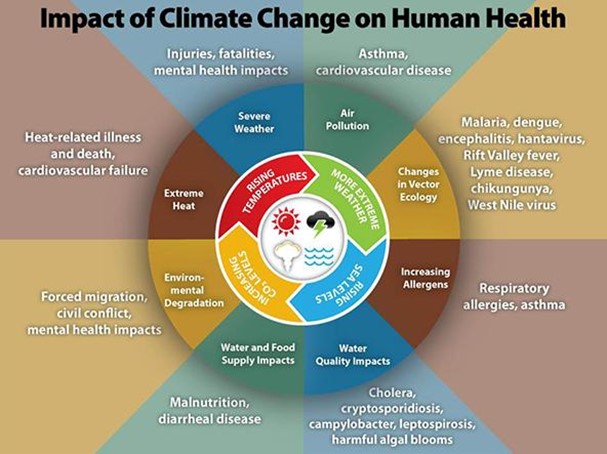
Source: CDC https://www.cdc.gov/climateandhealth/effects/default.htm
The severity of health risks as a result of changing climate depends on the ability of public health and safety systems to address or prepare for these changing threats, as well as factors such as an individual’s behavior, age, gender, and economic status. Impacts will vary based on where a person lives, how sensitive they are to health threats, how much they are exposed to climate change impacts, and how well they and their community are able to adapt to change.
The problem this project plans to address is to raise awareness by (1) educating Costa Mesa residents on how climate change affects their health and wellbeing, and (2) working together in a workshop setting to identify strategies and initiatives community members can take to enhance physical and mental health.
Raise awareness by providing educational workshops and materials on the threats that climate change presents to human health, and identify sustainability strategies that promote health while cutting carbon emissions.
As part of this project, the City of Costa Mesa’s sustainability office will host one public education and outreach workshop on how climate change impacts public health. The workshop will introduce the issue, and will provide participants with a more in-depth exercise that focuses on how individual community members can take action to mitigate the public health issues associated with climate change. They will be co-hosted and moderated by Salem Afeworki and Paula Buchanan, with input from subject matter experts in academia.
The final deliverables for this project are as follows:
The key priority for the City of Costa Mesa is to develop inclusive citywide programs and initiatives that promote environmental sustainability and community wellbeing, while enhancing economic prosperity.
Planning for the project has already started. The tentative schedule for the project’s deliverables and events is as follows:
| Deliverable | Date |
| Fact Sheet | October 2021 |
| Informational Video | December 2021 |
| In-Person Workshop (60-120 minutes) | TBD 2022* |
*If the COVID-19 pandemic continues, the In-Person Workshop event will either occur online, or occur in-person at a later date.
The City of Costa Mesa— just one mile from the Pacific Coast in the heart of Orange County—is one of California’s most eclectic and vibrant cities. The city is home to South Coast Plaza, one of the nation’s largest shopping centers, and the world-class Segerstrom Center for the Arts and South Coast Repertory theater. Costa Mesa is also the capital of the action sports industry and the headquarters for companies such as Hurley International, Volcom, RVCA, Rip Curl, and Vans.
The city’s diverse dining scene has earned Costa Mesa the award from Rand/McNally and USA Today as being the best small town for restaurants west of the Mississippi River. Costa Mesa’s creative bent has given rise to The Lab and The Camp, two counter-culture retail developments, and the SoCo Collection, a cutting edge, environmentally friendly shopping center.
Costa Mesa encompasses 16 square miles and has a population of 113,000. Since its incorporation in 1953, Costa Mesa has evolved from a semi-rural farming community of 15,000 to a city with robust local economy that generates tax revenues of about $100 million annually. A general law city, Costa Mesa has a council-manager form of government and staff of approximately 450 full-time employees.
What has been done to address this issue in the past?
The City has implemented the following sustainability projects:
The City of Costa Mesa is committed to the transformative change required to build a healthy, equitable, and sustainable community. Please visit the City’s sustainability website or read the 2020 Annual Sustainability Report for details.
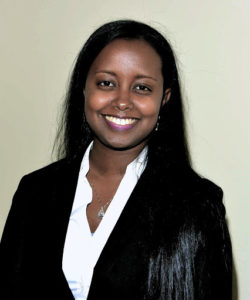
Salem Afeworki, Energy and Sustainability Services Manager, Department of Public Services, City of Costa Mesa, CA
Salem Afeworki, LEED GA, ENV SP, EcoDistricts AP is the Sustainability and Energy Services Manager at the City of Costa Mesa. She has 16 years of experience and is passionate about climate action, renewable energy technologies and community empowerment. At the City, she is responsible for developing and implementing all citywide sustainability programs and initiatives that build a safe, resilient, livable and inclusive city for all residents. Her goal is to make Costa Mesa a leader in Sustainability and is committed to working with diverse stakeholders to make that happen. Salem has her Bachelor’s Degree in Journalism and Communication, a Master’s Degree in Environmental Management & Auditing, specialized in Renewable Energy. She has also completed highly specialized leadership programs including a Climate Change Science and Solutions certificate from MIT and a Sustainable Environmental Management certificate from UC Berkeley.
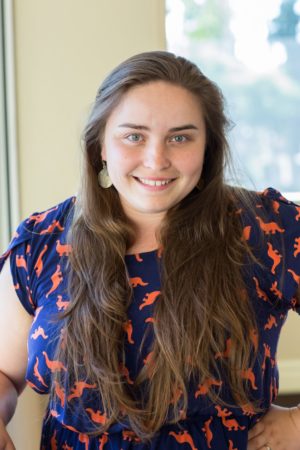
Dr. Dieuwertje “DJ” Kast is the Director of STEM Education Programs for the University of Southern California’s (USC) Joint Educational Project. Through her efforts, she has provided STEM instruction to over 29,000 underrepresented minority students, 600 educators, 25 school principals, and countless community members. She coordinates supplemental science and technology programs in Los Angeles for low income elementary school students of color across a gamut of schools through the Wonderkids, Young Scientists Program, and the Medical STEM Program. She holds a doctorate in education, focusing on Teacher Education in Multicultural Societies in STEM at USC. She received her master’s degree in education and biology teaching credential from the USC Rossier School of Education and she received her bachelor’s degree in Biology and a Master of Science in Marine Environmental Biology in 2011 from USC. Her work makes an impactful difference by leveling the playing field in STEM for low-income students of color in the Los Angeles area.
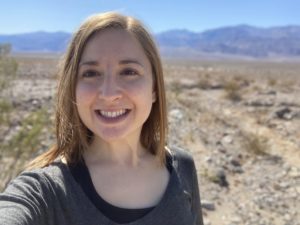
Kyla Kelly is a Ph.D. candidate in the University of Southern California’s (USC) Marine Biology and Biological Oceanography program. Her research focuses on examining how climate change may affect harmful algal bloom development and toxin production. Because harmful algal blooms can be made worse by human activity, and their occurrence consequently has impacts on human health, she feels that sharing climate science with the general public is important. Therefore, she serves as a science communicator with USC’s Young Scientists Program. In this position she develops marine biology and climate change curricula and teaches it to students in classrooms or educators in professional development workshops.
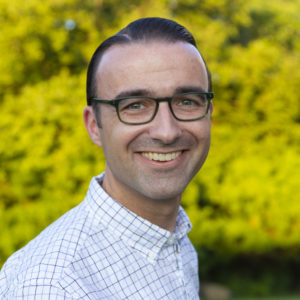
Kyle Tucker is an audiovisual engineer for Saint Joseph’s University in Philadelphia, PA. He is also the owner of Blue Blue Studios, a photography firm specializing in architectural, commercial, landscape, and street photography. Kyle’s interest in photography was sparked by a desire to document changes in his neighborhood nearly 20 years ago as an amateur historian.
Kyle’s experience as a self-taught photographer and videographer brings together his wide variety of past experiences and varied backgrounds to bring a fresh perspective to projects. His keen eye and flair for visual drama capture the essence of place and time. These same qualities also bring forth the emotional character and depth of his subjects.
In his spare time, Kyle shares his artistic talent with local organizations seeking events coverage. For more information on Kyle’s work, contact him directly at his website, https://www.bigbluestudios.net, and via email at [email protected].
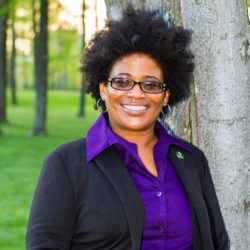
Paula Buchanan, Instructor. Disaster Resilience Leadership Academy (DRLA), Tulane University
Paula R. Buchanan is a disaster scientist and emergency management researcher. She is also an AGU Voices for Science Advocate in Communications. Her work lies at the intersection of public health, education, risk communication, and outreach messaging. Paula has professional experience in communications, university-level instruction, business continuity, and project management. She has an MBA and MPH with a Health Systems Management and Policy concentration from the University of Alabama-Birmingham; and graduated from Tulane University with a BS in Biology, BA in History, and a minor in Economics. A central question of her research is the extent to which socio-technical systems function as a communication channel to provide populations with accurate information to mitigate public health impacts associated with, or exacerbated by, disasters.
(c) 2024 Thriving Earth Exchange